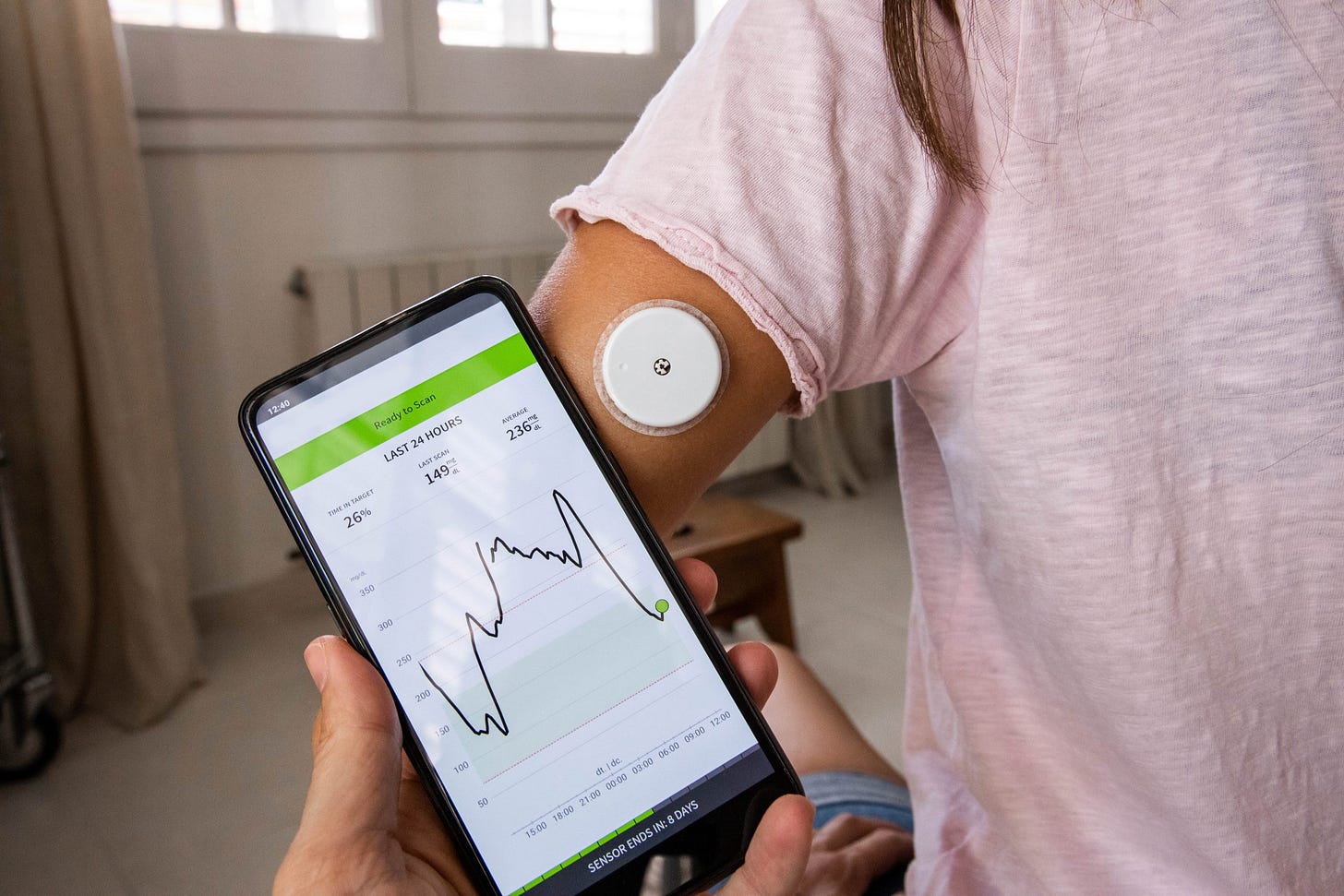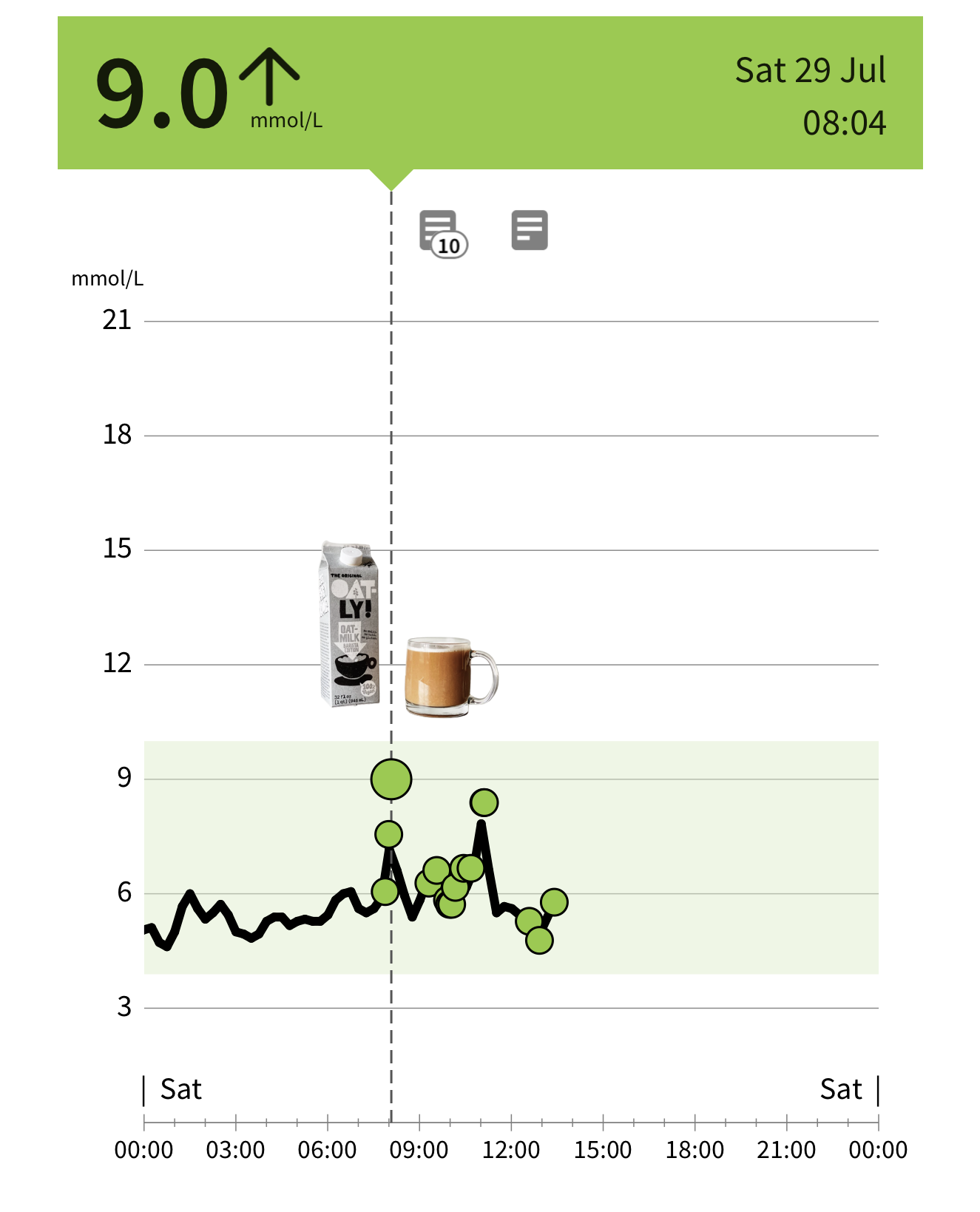PCOS and CGM (Part 1) #30
What CGM can tells us about health?
Hello everyone,
How was your week? This is Francesca from The PCOS Newsletter, where we are on a journey of getting to know our bodies and everything there is about PCOS.
Those who have been reading this newsletter for a while might have noticed how dedicated I am to understanding things in depth. This is why my articles are a bit longer and might seem complex from time to time. This is because I am determined to understand my own PCOS as much as possible whilst hopefully helping you.
For that reason, for the past week, I have been wearing a CGM (Continuous Glucose Monitor) 👇🏼.
I share below examples of food and how my blood sugar levels reacted.
This little device measures the glucose level in the fluid surrounding your cells. This is called interstitial fluid. It's not entirely as accurate as a finger prick test as it lags behind blood sugar levels by up to 15 minutes, but it does a good job as it’s used by type 1 diabetics to administer insulin. When you eat, your blood sugar levels go up till insulin comes in and takes it into the cells. This device measures glucose levels as they move up and down before and after you eat or drink.
This newsletter will remain free as I believe access to research and information shouldn’t have barriers. However, if you’d like to support my writing for the cost of a coffee per month, I would appreciate it. I dedicate most of my weekends and free time to this project, and your support will mean the world to me.
How is this relevant for PCOS?
There are a lot of commercial offerings (Zoe, Veri) selling these to healthy individuals. There is little research to show the usefulness of using these for healthy individuals, so I would be cautious, as it can lead to an unhealthy relationship with food if you start obsessing over the glucose spikes (expected when we eat). However, for us, this could be a good device to learn about our glucose levels. Given that one of the drivers of PCOS is insulin resistance (impaired glucose metabolism) it can be helpful to learn what foods might trigger spikes and try to avoid those that send our glucose levels through the roof.
People with insulin resistance, also known as impaired insulin sensitivity, have built up a tolerance to insulin, making the hormone less effective. As a result, more insulin is needed to persuade fat and muscle cells to take up glucose and the liver to continue to store it. Because of this, glucose levels tend to stay higher. Excess insulin leads to excess testosterone and an increased level of Leutenising Hormone (if you want to revise this, please head over here.)
Insulin resistance is pretty hard to diagnose, as it is not really a condition but a mechanism by which a disease might develop (type 2 diabetes). For this reason, there is no such thing as a test to diagnose insulin resistance. Hba1c/A1c is the closest and most accessible test to know if we have it. A recent blood test showed my Hba1c levels at 29mmol/mol (far from the diabetic 48 mmol/mol threshold).
In theory, I don’t have insulin resistance. Still, I am very curious to learn more about my metabolic profile, as I have always put weight on easily and lost it extremely hard. In addition, my PCOS symptoms are very responsive to diet, and a recent genetic test showed a small mutation in the TCF7L2 gene which is involved in insulin resistance. I will share more details about this genetic testing in a follow-on newsletter as it’s fascinating what I have learnt about my genes.
So, what did I find out from 5 days with CGM?
Before I got into this, blood sugar spikes are normal and how our body gets energy. It’s only problematic if they go outside of healthy ranges. So far, my blood glucose levels have not spiked out of normal ranges, but I have noticed some high spikes with some foods:
Grapes vs Apples
We know that grapes are pretty high in natural sugars. They are also pretty delicious. However, they spiked my glucose levels massively, even when eaten after lunch. When compared to an apple, the difference is pretty significant. Apples are also high in natural sugars but packed with fibre, which slows down digestion and the spike in glucose.
Grapes
One Apple
Oat milk Latte vs Soy Milk Latte
I love a good Oat Milk Latte, but unfortunately, it is one of the highest in carbohydrates in non-dairy milks. I gave this up nine months ago after another CGM monitoring experience but wanted to try it again to see what it does. It spiked my glucose levels more than anything else. I have switched to Soy, and it’s a very drastic difference.
Oat:
Soya:
Store-Bought BBQ Chicken Wrap vs Home Made Fajita
I used to have this once a week in the office, as it was an easy option. It also had quite a high amount of protein (24g), so I thought it would be a good choice. Well, turn out it also had quite a lot of sugars, and it did give quite a big spike. Compared to a homemade fajita, you can see a considerable difference.
Home Made Fajita
I hope you enjoyed this.
If anyone is interested in doing a 2 weeks experiment with me using a CGM, I am happy to create a group and we can share findings together and discuss what we are discovering. Please reply to this email if you are interested and I will organise something.
I will share more findings next week. See you Sunday.
Francesca
Disclaimer: We are all unique in our ways, so this information is for educational purposes only. In my communications, I summarise research data and bring my experience. This shouldn’t be viewed as medical advice at any point. Please further consult your healthcare provider about your health needs.








